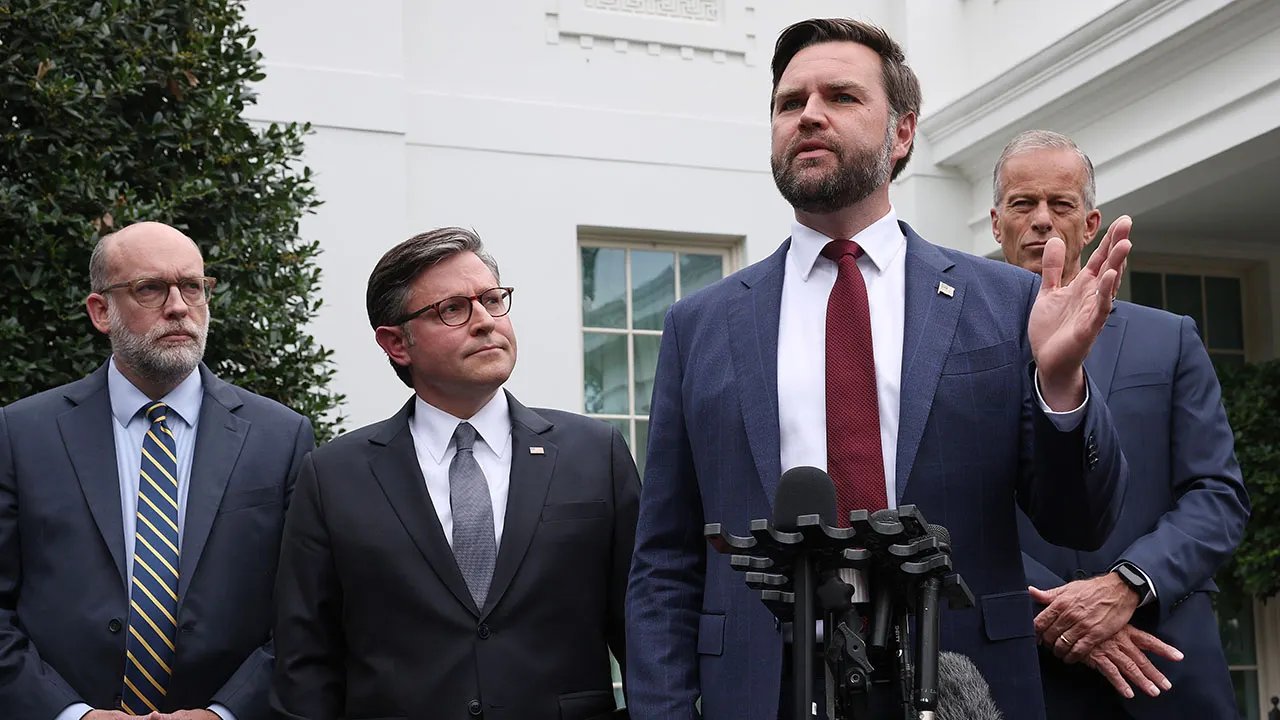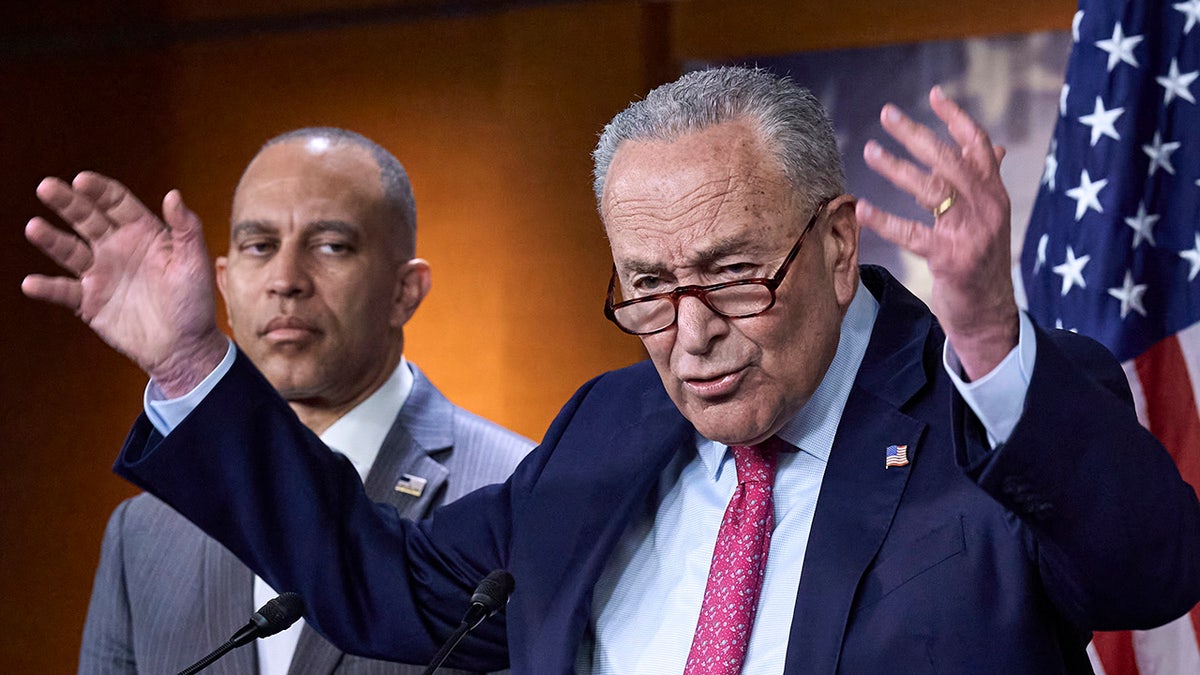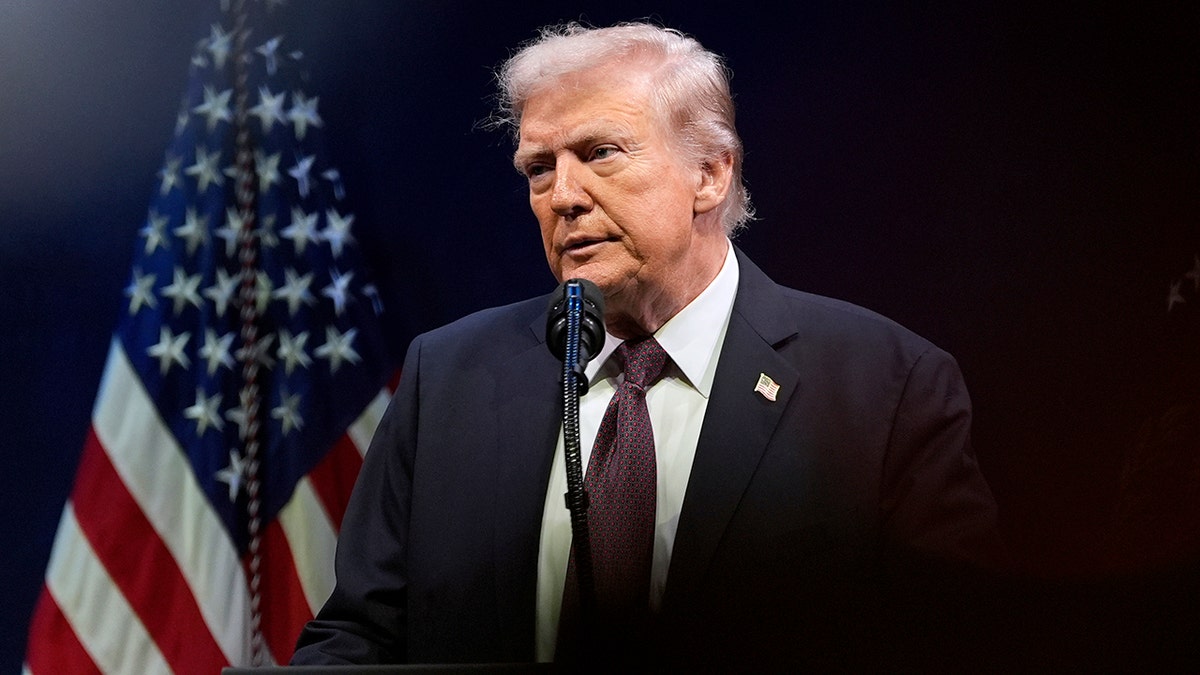INTERNACIONAL
Trump’s Middle East trip handed Israel a historic opportunity — if it chooses to act, experts say

TEL AVIV – As President Donald Trump wrapped up his high-stakes Middle East tour on Friday, many media outlets portrayed his decision to bypass Israel as evidence of a rift with Prime Minister Benjamin Netanyahu.
However, while Air Force One did not land in Israel, experts say Trump’s visit advanced policies that align closely with Israeli interests and presented a strategic opportunity that Jerusalem has yet to seize.
Avner Golov, vice president at MIND Israel and a former senior director of Israel’s National Security Council, told Fox News Digital, «Israel sees a massive wave approaching to sweep across the Middle East — a wave of momentum and change. The decision it faces is whether to ride it or be crushed beneath it.»
TRUMP MAKES HISTORIC UAE VISIT AS FIRST US PRESIDENT IN NEARLY 20 YEARS
President Donald J. Trump, left, and Saudi Crown Prince Mohammed bin Salman attend a bilateral meeting at the Saudi Royal Court on May 13, 2025 in Riyadh, Saudi Arabia. (Photo by Win McNamee/Getty Images)
Throughout the visit, Trump emphasized points that directly reflect Israeli priorities. On Tuesday, he condemned the Oct. 7 Hamas attacks, called for Saudi Arabia to join the Abraham Accords and warned Iran over its nuclear ambitions. On Wednesday, he even extended the normalization initiative to Syria.
When asked aboard Air Force One about skipping Israel, Trump said, «This is good for Israel. Having a relationship like I have with these countries… I think it’s very good.»
In Doha on Thursday, Trump went further, stating: «I want to see [Gaza] be a freedom zone. And if it’s necessary, I think I’d be proud to have the United States have it, take it, make it a freedom zone.»
According to two Arab officials quoted by The Times of Israel, U.S. Special Envoy to the Middle East Steve Witkoff told mediators in Doha that Washington does not intend to pressure Israel into ending the war in Gaza — aligning with Prime Minister Netanyahu’s firm stance.
On Friday, President Trump was asked in an interview with Fox News Chief political anchor, Bret Baier on Special Report, if he was frustrated with Netanyahu. Trump responded, «No, look, he’s got a tough situation. You have to remember there was an October 7th that everyone forgets, it was one of the most violent days in the history of the world. Not the Middle East, the world, when you look at the tapes. And the tapes are there for everyone to see.»

Israel Defense Forces troops re-enter the Gaza Strip following the collapse of the ceasefire. (IDF)
A readout released on Thursday by the State Department of a call between Secretary of State Marco Rubio and Prime Minister Netanyahu, also showed continued support for the Jewish state.
«The Secretary stressed the deep U.S. commitment to its historic relationship with Israel and the ironclad U.S. support for Israeli security,» adding «The Secretary and Prime Minister discussed Syria following President Trump’s historic meeting with Syrian President Ahmed al-Sharaa in Saudi Arabia. The Secretary and Prime Minister also shared their mutual commitment to make sure Iran never possesses a nuclear weapon.»
TRUMP SIGNS AGREEMENTS WITH QATAR ON DEFENSE AND BOEING PURCHASES
Channel 12 chief political correspondent Amit Segal told Fox News Digital, «There is an uncomfortable experience from an Israeli perspective to see Air Force One flying over us on its way to countries, some of which are outright hostile and others semi-hostile. If you are not at the table, you are on the plate.»
«But this isn’t personal. It’s not about Netanyahu and Trump,» Segal added. «Trump has full support for Israel — but when American interests come first, he acts accordingly. It’s America First.»
Dan Senor, host of the podcast «Call Me Back» and a former state department official, agreed that despite headlines suggesting tension, policy tells a different story.
«There’s always noise in the press,» Senor told Dana Perino, co-anchor of Fox News Channel’s «America’s Newsroom.» «But policy right now is very strong. We’re seeing maximum pressure on Iran, no public criticism of Israel — even as dozens of Israeli tanks are positioned near Gaza.»

President Donald Trump, center, meets with Syrian President Ahmed al-Sharaa in Riyadh, Saudi Arabia, on May 14, 2025. (Saudi Press Agency/Handout via REUTERS)
TRUMP SAYS HE’LL DROP SANCTIONS ON SYRIA IN MOVE TO NORMALIZE RELATIONS
«What I found problematic in past administrations — especially under Obama — was when private criticism became public,» Senor added. «That gave others a green light to pile on Israel. This administration, even if it disagrees, isn’t airing it. And that matters most.»
On Friday, in a proclamation marking Jewish Heritage Month, Trump stated, «I believe there has never been a greater friend to the Jewish people than my Administration. We will never deviate from our conviction that anti-Semitism has no place in the greatest country in the world. As the 47th President of the United States, I will use every appropriate legal tool at my disposal to stop anti-Semitic assaults gripping our universities. We will proudly stand with our friend and ally, the State of Israel. I will never waver in my commitment.»
Tamir Haiman, former head of Israel’s Military Intelligence and now director of the Institute for National Security Studies, said the Israeli government feared being caught off guard.
«This is a player so strong that sometimes, without intending to, he can throw a small player off the field — like a giant who’s spinning and accidentally knocks someone out of his way with his shoulder,» Haiman told Fox News Digital.
However, he emphasized that the developments in Saudi Arabia, Qatar and Syria are not inherently bad for Israel — unless the government fails to act.
«The missed opportunity here is enormous,» he said. «There were two major levers Israel had — Israeli consent to U.S. arms deals with Saudi Arabia and American consent to lifting sanctions on Syria. Both could have been used to advance key Israeli interests: normalization with Saudi Arabia and ensuring Syria’s development follows a non-jihadist path. And we [Israel] lost both.»

President Donald Trump, left, is presented with the Order of Zayed, the UAE’s highest civilian distinction, by UAE President Mohammed bin Zayed Al Nahyan on Thursday, May 15, in Abu Dhabi, United Arab Emirates. (AP/Alex Brandon)
TRUMP SAYS US HAS GIVEN IRAN PROPOSAL FOR NUCLEAR DEAL
The sense of urgency grew last week when Trump abruptly paused U.S. airstrikes on Iranian-backed Houthis just days after a missile landed near Ben Gurion Airport. Reports soon followed that Washington had dropped its demand for Israeli-Saudi normalization as a prerequisite for a U.S.–Saudi nuclear pact — a strategic goal long championed by Netanyahu.
Reuters later confirmed the shift. Meanwhile, Saudi officials made clear that progress on the Palestinian issue remains a prerequisite for any nuclear deal — something seen as unlikely while the war in Gaza continues.
«After the Saudi story, where we were thrown under the bus, I said we need to stop and investigate,» Haiman said. «We shouldn’t just say it’s the president’s whims. We need to ask, ‘What depends on us? What needs to change?’ I’m not sure they’re doing that.»
The sharpest potential rift remains Iran. Jerusalem views a nuclear-armed Tehran as an existential threat. Haiman calls this «a historic window» to stop it, by force if needed. «The American interest is to finish wars, not enter them, and to seal a deal better than Obama’s,» he said, warning that a diplomatic track pursued over Israel’s head could soon limit Israeli military options.

Edan Alexander meets with his extended family following his release. (IDF)
Monday’s release of 21-year-old American-Israeli Edan Alexander, freed after direct talks between Washington, Qatar and Hamas, added to some fears of Jerusalem being sidelined. Israel played only a logistical role.
Within Israel, the Gaza war continues to divide strategists over whether to keep pressing Hamas or stop the war for a hostage deal. Haiman called the current «fight, deal, fight» rhythm «boiling the frog,» but acknowledges that without a hostage deal now, the 21 living hostages might not survive.
CLICK HERE TO GET THE FOX NEWS APP
Golov believes it is time for Israel to stop reacting and start shaping events. He urged Jerusalem to push Washington to demand that «Qatar must stop funding Hamas, stop Al Jazeera’s incitement, and pay a price for interfering inside Israel.» Israel, he argued, does not have the leverage to do that alone.
«It must anchor itself in a regional bloc — with the Emirates, Saudi Arabia, and Jordan — states that are just as terrified of a Muslim Brotherhood resurgence.» To get there, he said, Israel must climb aboard the wave Trump has already set in motion.
INTERNACIONAL
Estados Unidos: cazarrecompensas y redadas, la sombra de la deportación persigue a los latinos de Washington

La militarización de Washington está rompiendo el tejido social
Cazarrecompensas al servicio de la deportación de Trump
1.000 dólares por inmigrante indocumentado entregado
Los restaurantes se vacían porque los clientes tienen miedo de salir
Baja a la mitad la asistencia a las misas por miedo a ser detenidos
«La gente está desafiando al ICE»
INTERNACIONAL
JD Vance says government likely ‘headed into a shutdown’ after Trump meets with Dems

NEWYou can now listen to Fox News articles!
Republican and Democratic congressional leaders left a meeting with President Donald Trump with no deal to avert a government shutdown as the deadline fast approaches.
Leaders met with Trump on Monday for roughly an hour to negotiate a path forward to avert a partial government shutdown, but it appeared neither side was willing to budge from their position.
Vice President JD Vance said after the meeting, «I think we’re headed into a shutdown because the Democrats won’t do the right thing. I hope they change their mind.»
«If you look at the original they did with this negotiation, it was a $1.5 trillion spending package, basically saying the American people want to give massive amounts of money, hundreds of billions of dollars to illegal aliens for their health care, while Americans are struggling to pay their health care bills,» Vance said. «That was their initial foray into this negotiation. We thought it was absurd.»
DEMS NOT BUDGING ON GOVERNMENT SHUTDOWN DEMANDS AHEAD OF HIGH-STAKES TRUMP MEETING, JEFFRIES SUGGESTS
Vice President JD Vance, Speaker Mike Johnson, R-La., Senate Majority Leader John Thune, R-S.D., and Office of Management and Budget Director Russ Vought spoke to reporters after congressional leaders met with President Donald Trump on Sept. 29, 2025. (Win McNamee/Getty Images)
Democrats, however, have pushed back on assertions that they’re looking to salvage healthcare for anyone but the American people.
«There was a frank and direct discussion with the President of the United States and Republican leaders. But significant and meaningful differences remain,» Jeffries said. «Democrats are fighting to protect the health care of the American people, and we are not going to support a partisan Republican spending bill that continues to gut the health care of every day America, period.»
Congress has until midnight Oct. 1 to pass a short-term funding extension, or continuing resolution (CR), to avert a partial government shutdown. The House already passed a funding extension, but the bill was blocked in the Senate earlier this month.
Republicans and the White House want to move forward with their «clean,» short-term funding extension until Nov. 21, while Democrats have offered a counter-proposal that includes a permanent extension of expiring Obamacare tax credits and other wishlist items that are a bridge too far for the GOP.
Vance appeared alongside Speaker Mike Johnson, R-La., Senate Majority Leader John Thune, R-S.D., and Office of Management and Budget (OMB) Director Russ Vought in a show of Republican unity after the meeting, but made clear both sides are still far apart.
Thune, holding up a copy of the funding extension, panned Jeffries and Schumer’s accusation that the bill was partisan in nature.
Congressional Republicans argue that the House GOP’s is everything that Democrats pushed when they controlled the Senate: a «clean,» short-term extension to Nov. 21 without partisan policy riders or spending, save for millions in new spending for increased security for lawmakers.
SHUTDOWN EXPLAINED: WHO WORKS, WHO DOESN’T AND HOW MUCH IT COSTS

Senate Minority Leader Chuck Schumer, D-N.Y., and House Minority Leader Hakeem Jeffries, D-N.Y., left, hold a news conference on the GOP reconciliation bill, at the Capitol in Washington, Wednesday, June 11, 2025. (AP Photo/J. Scott Applewhite, file)
«To me, this is purely a hostage-taking exercise on the part of the Democrats,» Thune said. «We are willing to sit down and work with them on some of the issues they want to talk about, whether it’s an extension of premium tax credits, with reforms, we’re happy to have that conversation. But as of right now, this is a hijacking.»
Neither Schumer nor Jeffries took questions after their remarks, but appeared slightly more optimistic than their GOP counterparts after the meeting concluded.
«I think for the first time, the president heard our objections and heard why we needed a bipartisan bill,» Schumer said. «Their bill has not one iota of Democratic input. That is never how we’ve done this before.»
Vance said he was «highly skeptical» that it was Trump’s first time hearing the issue and said there was a bipartisan path forward on healthcare – but panned Democrats’ push to include an extension of COVID-19 pandemic-era Affordable Care Act (ACA) extensions in the bill.
«We want to work across the aisle to make sure that people have access to good healthcare,» he said, but added, «We are not going to let Democrats shut down the government and take a hostage unless we give them everything that they want. That’s not how the people’s government has ever worked.»
The meeting in the Oval Office comes after Trump canceled a previously scheduled confab last week with just Schumer and Jeffries. At the time, the president railed against their demands on his social media platform Truth Social and contended that congressional Democrats were pushing «radical Left policies that nobody voted for» in their counter-CR.

President Donald Trump speaks at a hearing of the Religious Liberty Commission at the Museum of the Bible, Monday, Sept. 8, 2025, in Washington. (AP Photo/Alex Brandon)
CLICK HERE TO GET THE FOX NEWS APP
Democrats’ demands center on an extension to expiring Affordable Care Act subsidies, though their counter-proposal also included language to repeal the healthcare section of the GOP’s «big, beautiful bill» and a clawback of canceled NPR and PBS funding.
Senate Republicans have argued that Democrats’ desires are unserious, and Thune has publicly said that Republicans would be willing to have discussions on the ACA subsidies, which are set to sunset at the end of this year, after the government is funded.
Schumer insisted Democrats needed it addressed immediately, however, in a press conference back on Capitol Hill after the meeting.
«We think when they say later, they mean never. We have to do it now, first because of the timing issue and second, because now is the time we can get it done,» he said.
The White House is also leveraging the threat of mass firings should the government shut down that go beyond the standard furloughing of nonessential employees. Still, Schumer and Senate Democrats have not buckled.
The Senate is expected to vote again on the bill on Tuesday.
politics,house of representatives politics,government shutdown,senate,jd vance
INTERNACIONAL
La reunión entre Trump y los líderes demócratas terminó sin acuerdo para evitar el cierre del Gobierno

La reunión entre los líderes demócratas del Congreso y el presidente estadounidense, Donald Trump finalizó este lunes sin que se alcanzara un entendimiento para tratar de evitar el cierre del Gobierno federal que se activaría a partir de este miércoles.
“Tenemos grandes diferencias en materia de salud y en su capacidad para revertir cualquier presupuesto que acordemos mediante rescisiones y embargos”, declaró a la prensa el líder de la minoría demócrata en el Senado, Chuck Schumer, al salir de la Oficina Oval de la Casa Blanca tras su reunión con el mandatario.
De acuerdo con los demócratas que asistieron a la reunión, se hizo ver a Trump “las consecuencias de lo que sucede en la atención médica al buscar recortes de seguros de salud”.
“Por su rostro, parecía que era la primera vez que escuchaba sobre este problema”, dijo Schumer a la prensa sobre la reacción del presidente durante el encuentro, en el que también estuvo el líder de la minoría demócrata en la Cámara de Representantes, Hakeem Jeffries, así como los líderes republicanos en la Cámara Alta y Baja, John Thune y Mike Johnson.
Por su parte, el vicepresidente estadounidense, J.D. Vance, dijo a medios al salir de la reunión: “Creo que nos encaminamos hacia un cierre porque los demócratas no harán lo correcto”.
En menos de dos días las expira el plazo para lograr un acuerdo de financiamiento para el Gobierno, y ambas partes insisten en señalar al opositor como responsable por no ceder.
Los demócratas exigen que se prorroguen los subsidios de la ley para el cuidado asequible de la salud (Obamacare) que expiran a final de año, así como la reversión de los recortes al programa Medicaid que resultaron de la gran ley de recortes presupuestarios y fiscales aprobada en julio pasado.
Sin embargo, los republicanos en el Congreso han dicho que aceptarán negociar ambos apartados solo si los demócratas dan su apoyo a un presupuesto provisional en una votación que tendría lugar mañana en el Senado y que mantendría el Gobierno operativo hasta noviembre.
Los republicanos presentaron el pasado 19 de septiembre ese presupuesto provisional en el Senado para su ratificación, pero este resultó rechazado porque su mayoría en la Cámara es insuficiente y requiere de al menos siete votos demócratas para la aprobación del proyecto de ley.
Al riesgo de una paralización del Gobierno federal se añade la posibilidad de despidos masivos de funcionarios públicos, según un memorando de la Oficina de Gestión y Presupuesto, que ha ordenado a las agencias que identifiquen programas clasificados como no esenciales para continuar su misión y reducir el personal federal.
Si el Congreso no toma medidas, miles de trabajadores del Gobierno federal podrían ser suspendidos, desde la NASA hasta los parques nacionales, y una amplia gama de servicios se verían interrumpidos.
Los tribunales federales podrían tener que cerrar y las subvenciones a las pequeñas empresas podrían retrasarse.
Los enfrentamientos presupuestarios se han convertido en algo relativamente rutinario en Washington en los últimos 15 años y a menudo se resuelven en el último minuto. Sin embargo, la voluntad de Trump de anular o ignorar las leyes de gasto aprobadas por el Congreso ha inyectado una nueva dimensión de incertidumbre.
Los demócratas han presentado un plan que prorrogaría la financiación actual entre siete y diez días, según fuentes del partido, lo que podría dar tiempo a alcanzar un acuerdo más duradero. Se trata de un plazo más corto que el respaldado por los republicanos, que ampliaría la financiación hasta el 21 de noviembre.
El líder republicano en el Senado, John Thune, trató de presionar a los demócratas programando una votación el martes sobre el proyecto republicano, que ya fracasó una vez en el Senado.
Ha habido 14 cierres parciales del Gobierno desde 1981, la mayoría de los cuales duraron solo unos días. El más reciente fue también el más largo, 35 días en 2018 y 2019 debido a una disputa sobre inmigración durante el primer mandato de Trump.
(Con información de EFE y Reuters)
Corporate Events,North America,Government / Politics,WASHINGTON

 CHIMENTOS3 días ago
CHIMENTOS3 días agoFlor Jazmín Peña reveló la profunda crisis que tuvo por culpa de Nico Occhiato

 CHIMENTOS3 días ago
CHIMENTOS3 días agoMirtha Legrand bloqueó a una famosa periodista en WhatsApp y ella está desesperada para que le vuelva a hablar

 POLITICA2 días ago
POLITICA2 días agoFrancos apuntó al gobierno de Kicillof por el triple femicidio narco: “¿Qué dirá la gente que votó a Magario?»
















